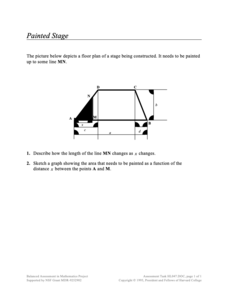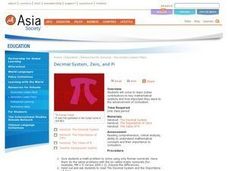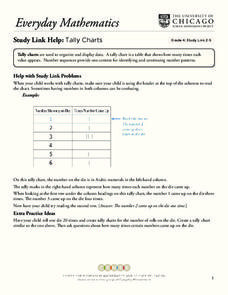Balanced Assessment
Number Game
It's all in the numbers! Create a mathematical model to analyze a number game and develop a winning strategy. Using a given numerical pattern, scholars write an expression to model the scenario. They then interpret the pattern of the...
Concord Consortium
From Tan to Ten
Combine simplifying trigonometric expressions with evaluating them! An open-ended question presents a trigonometric expression and numeric values for additional expressions. Learners must determine a value for the original expression by...
Curated OER
Number 1
In this number recognition worksheet, students examine the Arabic numeral 1, the word "one", and count the 1 pictured star. Worksheets include a color version and black and white template version.
Curated OER
Roman Numerals
Studetns recognize Roman numerals and identify each symbol and what it stands for.
Balanced Assessment
Fit-Ness
Serve four towns with one bus route. Pupils develop a bus route that meets certain criteria to serve four towns. They determine which of the routes would best serve all of them. Individuals then hypothesize where a fifth town should be...
Concord Consortium
Painted Stage
Find the area as it slides. Pupils derive an equation to find the painted area of a section of a trapezoidal-shaped stage The section depends upon the sliding distance the edge of the painted section is from a vertex of the trapezoid....
Curated OER
Concepts in Algebra
Study Islamic achievement in mathematics by exploring the six standard forms of equations. High schoolers will review the six forms of equations of Al-Khwarizmi. They solve equations using different forms. Links and resources are...
Code.org
Number Systems
Generating a system of shapes. Groups work together to create a number system using three different shapes as symbols. The groups should come up with the rules that generate all the possible permutations of the three shapes.
Curated OER
Learning about Fibonacci
In this learning about Fibonacci worksheet, students read about Leonardo Fibonacci and his contribution to mathematics, then study the pattern of Fibonacci numbers, in math and in nature.
Foreign Policy Research Institute
Islamic Civilization in Spain
There may be elements of this lesson plan that are useful for a unit on Islamic influence in Spain; however, there is little alignment between the learning objectives and the final product --a ten page report. For example, some of the...
Curated OER
Who Wants to Win Millions: Number Up to 1,000
Challenge your second or third graders with this game in which they have to spell numbers up to a thousand. This is a fun and motivating way to review this concept. It could be used as a center activity.
Curated OER
The History of Mathematics
Research the interrelationship between math and science. Search the Internet to discover the history of several branches of mathematics and make text-to-world connections between the concepts covered in each branch with related...
Balanced Assessment
Bumpy-Ness
Develop a new measure of the properties of an object. Scholars develop a definition and formula to measure the bumpy-ness of an object. They utilize their formulas to find the property for several spherical objects.
Balanced Assessment
Gligs and Crocs
Explore relationships between perimeter and area. Learners compare the measurement units of gligs and crocs. They use a given perimeter and area as well as specific measurement relationships to determine the scale of gligs to crocs.
Balanced Assessment
Compact-Ness
Creating a definition may be easier than it sounds! Give your classes experience creating their own definition. Scholars examine the meaning of the compact-ness of a scatter plot and create their own definitions based on measurements.
Balanced Assessment
Blirts and Gorks
Start a trend by using blirts and gorks as your standard unit of measures. The activity asks learners to take a known measures of blirts and gorks and develop a conversion ratio. Individuals use both perimeter and area measures of...
Concord Consortium
Square-Ness
Are there some rectangles that are more square than others? A thought-provoking task asks individuals to create a formula that objectifies the square-ness of a set of rectangles. They then use their formulas to rank a set of rectangles.
Concord Consortium
Sharp-Ness of Bends
Define the sharpest in the group. Given a section of a trail map, pupils determine a method to measure the sharpness of each turn in the path. Individuals then determine what modifications to their formulas to make to find the sharpness...
Curated OER
Discovering Math: Concepts in Algebra
Students learn that speed is a function of time and distance, a quadratic equation can be used to figure out the path of fireworks, a photographer can use Algebra to figure out how many rolls he can afford if he needs twice as much of...
Curated OER
Decimal System, Zero, and Pi
Pupils explore Indian contributions to mathematics. In this mathematics history lesson, students examine the decimal system, zero, and pi as contributions from the Indian culture.
Curated OER
Outlining for Beginners
Learners examine the standard form of an outline by viewing several examples. They practice categorizing information and then create a simple outline.
Curated OER
A Method of Front-End Arithmetic
Teach the class how to add using front-end addition. They are given a shopping list and use it to practice adding from the largest place value to the smallest. Computational math and shopping, what fun!
Curated OER
Tally Charts
In this tally charts learning exercise, students discuss how to use a tally chart and how to read the chart. Once students record information on a tally chart they answer questions showing their ability to read a tally chart.
Curated OER
A Crossroads in Israel
Students explore Middle Eastern relations. In this current events lesson, students research the listed Web sites that include information about the history of the conflict between the Israelis and the Palestinians. Students determine how...

























